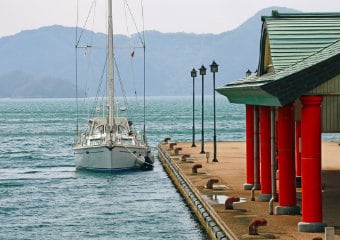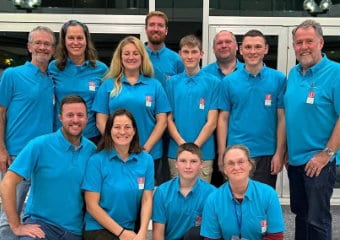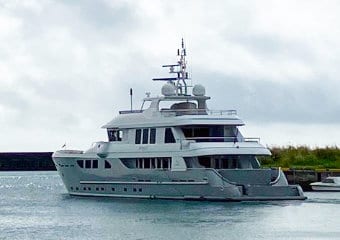Covid-19 has definitely had an adverse impact on the cruising community. Cruisers around the world have had their cruising plans seriously disrupted, often trapped in ports that are unsafe during tropical cyclones, unable to get provisions, parts, and medications, and unable to fly home for medical, family, and other emergencies.
Here in Japan, the number of arriving foreign cruisers is down by about 90% and cruisers already in the country have been unable to move on to their next destinations (creating significant visa complications for some), and many people who left their boats in Japan and went home for the winter are now unable to return to take care of their boats and continue cruising. Even domestic cruisers have been affected as many of the fishing ports now discourage visitors and some of the Umi no Eki (Sea Stations) have closed or curtailed their operations.
Hopefully, things will be somewhat back to normal next year, but in the meantime there's no lack of cruising-related topics to think and talk about. Here are a few.
"New pec smart" Now Available on Android
As discussed several times in this website (here and here), I have highly praised new pec, the excellent Japan charting software developed by the Japan Hydrographic Association. In particular, I have strongly recommended that cruisers use the app version, new pec smart.
To date, new pec smart has only been available for iPhones/iPads but, effective July 1, there is now an Android version. It has all the great features of the Apple version and is available for the same low price of ¥960 / month. Here's the press release (PDF) announcing this news.
To learn more about new pec smart and for the links to sites for downloading either the Apple or Android app (in Japanese only), go to their website.
New pec smart is still only in Japanese, but it's a very intuitive, easy-to-use product even for those who don't read Japanese. An hour or two with a Japanese friend is usually enough to get one familiar with how to use the product's various features. And Konpira Consulting offers a tutorial and ongoing support for new pec smart subscribers.
Covid-19 Restrictions on Entering Japan
There continues to be considerable uncertainty, confusion, and inconsistency about the Covid-19 rules governing foreigners wanting to enter Japan on private boats.
For example, website information from Immigration, which is part of the Ministry of Justice, is different in various important respects from information in the Ministry of Ministry of Foreign Affairs (MOFA) website. For example, the MOFA website suggests that passport holders from a few countries, including New Zealand, can get short-term (90-day) visas upon arrival in Japan, but Immigration says that visas, issued only under special circumstances (and not for ordinary tourism), have to be obtained in advance at a Japanese embassy or consulate. One Immigration official bluntly told me that "MOFA is wrong."
There is also regional inconsistency. Okinawa Immigration, for example, is much more open to allowing in foreign cruisers – one of my clients, from New Zealand, had no problem entering in late May, after the current regulations were put in place – than Fukuoka, which told me that he could not enter.
And, to further complicate matters, there is no national Quarantine policy on how to implement the 14-day self-isolation requirement for arriving cruisers. Each of the 13 regional Quarantine offices is free to make their own determination. For the NZ cruiser in Okinawa, he was simply told not to use public transportation (buses, taxis, etc.) but was otherwise free to go to shops, restaurants, and the like, and he was allowed to continue cruising, stopping at various islands as he headed north. Quarantine offices also differ as to whether or not they count time at sea toward the 14-day isolation period and for determining which countries a person has visited in the 14 days before arriving in Japan.
I have been told that Japan will soon update and relax the visa and quarantine policies, probably effective September 1. Hopefully, that will eliminate, or at least reduce, the problems with the current policies, as well as make Japan an attractive destination for cruisers trying to get back "on the road" after the Covid-19 disruption.
Watch this space for more updates on this issue.
Weird Typhoon Season

As I write this (August 23), I am following a medium-strength tropical storm – Bavi – that tracked far west of Okinawa and is now heading toward Korea, strengthening along the way. With its passing (and with no other storm in sight), this will mean that Japan has not experienced a full-scale typhoon in the first eight months of the year, the first time that has happened since the Japan Meteorological Agency started keeping records in 1951. There has been a total of only nine tropical storms so far this year, and none has been especially strong and none has hit Japan directly.
In May, forecasters were predicting that 2020 would be a normal typhoon year for the NW Pacific. So far, though, this is shaping up to be one of the least active years in history.
What is especially unusual is where the typhoons are forming this year. Usually, typhoons form east of Guam and then gather strength for a week or more as they head west and then, often, northwest and north toward Japan. This year, however, seven of the nine systems to date formed in the far western Pacific, near the Philippines and Taiwan. As a result, they are not crossing hot, open oceans long enough to become very powerful systems. In addition, a strong high-pressure system covering the Japanese archipelago has prevented the few storms that have developed from reaching Japan.
All in all, it's been a very weird start to the typhoon season. And, for the sake of all cruisers, and especially for four of my clients whose boats have been left in Japan, I hope that this continues to be a record-setting quiet year. At the same time, I am well aware that unusual weather patterns can just as easily be malevolent as benevolent... "normal" is much more reassuring. We could, quite literally, be experiencing the "calm before the storm" as Mother Nature saves her power for super typhoons later in the year.
To learn how Konpira Consulting can help you enjoy the wonders of Japan's oceans, please feel free to contact us for more information.





